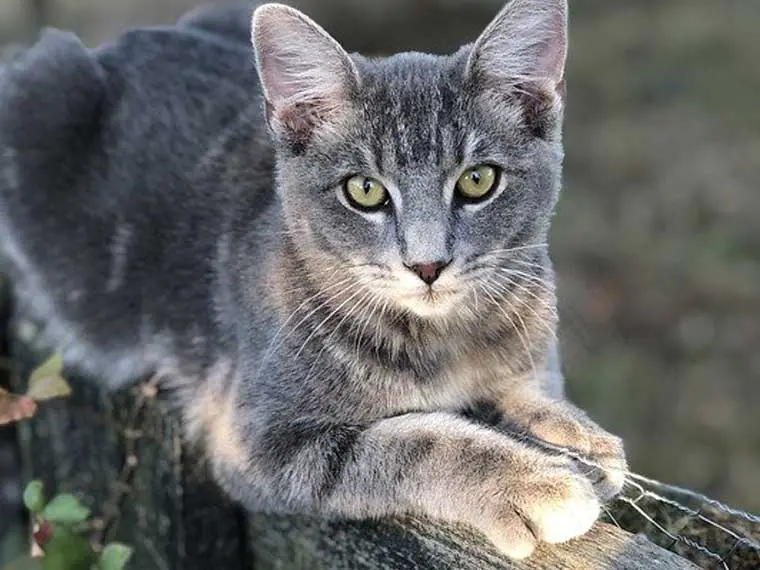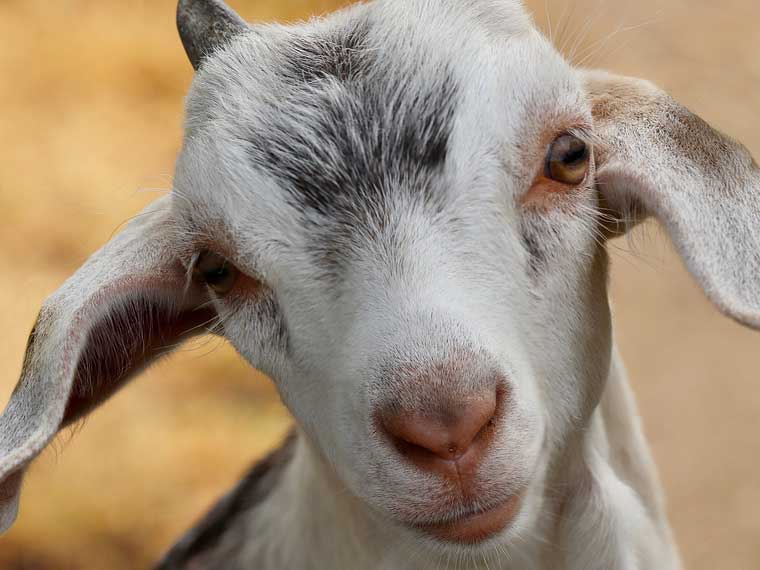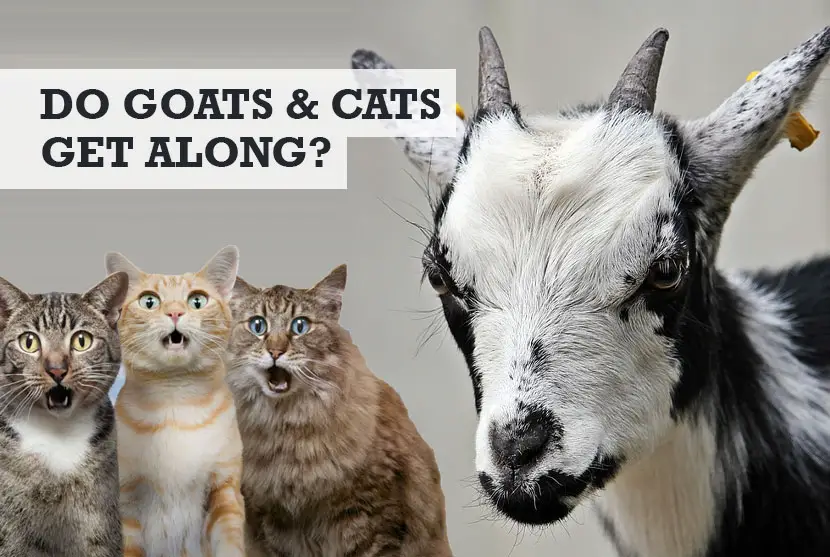Goats are sociable animals, and for the most part, so are cats. They both share certain characteristics such as curiosity, exploring and climbing (in the case of mountain goats). But what if you own a cat and want to get goats or vice versa? Here’s my guide to whether goats and cats can live together.
Do goats and cats get along? Goats and cats should be able to live on the same property, as neither considers the other a predator. It will need to be on a case-by-case basis, but overall, there’s nothing to suggest that most goats and cats can’t live together and get along.
The bottom line is that these two species will more than likely happily occupy the same space. One thing to be aware of though is a risk of the cat passing toxoplasmosis to goats. This can be mitigated as I will explain further down the page.
Can goats and cats live together?
As established, yes, goats and cats can live together. But if you are going to let them share an environment there are some important aspects to consider.
For example, goats and cats do not share the same tastes in food so that should not prove contentious. If the animals are all inoculated against their common diseases, and dewormed regularly, there should be no transfer of disease or parasites.
Care should be taken, however, that the cats do not see the goat bedding or feed bin as a litter tray.
Favourable attributes for goats and cats to cohabit
Sociability
Goats are sociable animals and will make acquaintances with most barn animals. They thrive best, however, amongst their own kind so the chances are that you have a herd of goats, even if it is a small one.
Cats, on the other hand, are more self-serving. They also exhibit a range of personality traits. Some are cantankerous loners whereas others will show affection with abandon. If your cats live outside, in the barn, they may appreciate the body heat of a compliant goat on a cold winter’s night.
Kittens and kids are naturally playful and will no doubt enjoy each other’s company.

However, a mother goat may take exception to a large cat hanging around her newborn offspring. A male goat, in rut, may also not be in the mood to tolerate anything that distracts from his cause.
Both goat sexes have horns which they could use to harm a cat. If the cat is sensible and has an escape route, it will not come to any harm.
Adult cats may be less tolerant of baby goats, than kittens are. They are not likely to harm them beyond the odd warning hiss and slap, which the kids will soon come to understand.
How to introduce a cat to a goat
When introducing cats to a barn with goats and other livestock, do so when they are young. You will probably have more success with kittens from another farm or barn, or with feral cats. These can be enticed indoors with food.
Sense of adventure
Curiosity killed the cat, and most likely a few goats as well. They do not hesitate to enquire about new environments and circumstances. The young, especially, will be eager to socialise with new friends that are different from themselves.
Goats and cats are adventurous and need to be provided with ample space and apparatus to exercise their ability and need to clamber and climb. The ideal goat environment will suit them both.

Handy Hint: Such is the independent nature of goats, that if you have more than one, you might find herding them very tricky!
Food
Notwithstanding the odd raid on the washing line, goats are vegetarian and somewhat fussy eaters. They are browsers so their preferred environment would include a few trees and bushes.
Cats are predominantly carnivores and therefore there should be little contention for food. Barn cats will provide the added benefit of ridding the sleeping quarters of rats, mice, and other vermin.
Goat pellets are alien to cats who might confuse these for litter so if the feed bins are easily accessible to the cats, it is best to fit them with lids.
Handy Hint: Whilst rare, it is possible for goats and sheep to breed.
Downsides to goats and cats living together
Even if your goats and cats get along, there could still be come negatives to them sharing a living space.
Differing hygiene habits
Goats cannot be house trained. They will pee and poop wherever they are. This debris could land in their bedding, in their food, and even in their water. This does not make them good neighbours for the more fastidious members of the cat family.
Your goat environment should be replenished regularly. The bedding needs to be changed often, and fresh water provided daily.
It is advisable to provide barn cats with litter trays. Cats like to bury their faeces and, in the absence of soil or a litter tray, may think that goat bedding is a viable alternative. This is especially likely in winter when the ground is cold or frozen.
If you are introducing cats to a barn, it is best to do so in spring when they can follow their natural instincts and do their business outdoors.
If your cat has kittens in the barn, it would be better to keep the kittens out of the way of curious goats. In addition, they should not be allowed to contaminate the goats’ bedding.
Goats are smelly!
In general, goats do not make sweet smelling bedfellows. This odorous quality is probably more attractive to dogs, who will roll in anything to acquire a peculiar scent.
In the mating season, the bucks will emit a pungent musty aroma and may resort to bathing their faces in urine to appear particularly attractive to the opposite sex.
Cats have an exceptional sense of smell. Reports vary but they claim that cats have between 15 and 40 more olfactory sensibility than the average human.
In addition, they can detect scents like pheromones and hormones. The odour of an amorous male goat is likely to make them gag.
Handy Hint: Here’s why goats like to headbutt each other.
Transmitting disease and parasites
Your goats and cats might get along, but they will still need to be vaccinated against all known diseases so that they do not spread these to each other, humans, and other animals. As well as a vaccination program, regular deworming is needed to prevent cross infections.
Goats, despite their hardy reputation, can suffer from a host of diseases, many of them treatable and preventable through vaccinations and other prophylactic remedies.
Some of the diseases are particular to the young, others to females and expectant mothers, and yet others occur only in males.
Zoonotic are communicable diseases that can be transmitted across animal species, and even to humans. These diseases can be transmitted through saliva, faeces and directs skin contact.
A good preventative program should ensure these do not affect your animals or yourself.
The most infectious include:
- Rabies – which results in dementia, severe spasms, and ultimately death
- Soremouth – which produces skin lesions.
- Ringworm – a fungal disease that is transmitted via skin contact.
- Chlamydiosis – produces spontaneous abortions. Pregnant farm workers should never work with pregnant livestock or their aborted fetuses.
- Anthrax – causes fever, systemic internal haemorrhaging, and death.
- Pasteurella – causes fever, difficulty breathing, nasal discharge, and fatalities.
Bacterial infections can be transmitted through the consumption of uncooked meat, unpasteurised milk, and contaminated water. These include listeriosis and salmonella which could have serious health implications, including death.
Cats and toxoplasmosis
Cats pose a threat in that they carry the parasite that causes toxoplasmosis. Unless they have a compromised immune system, cats are rarely affected by it. They are a necessary link in the transference of the parasite to other animals, including goats and humans.
The parasite is ingested when a cat eats the meat of small rodents or uncooked infected meat of another species. It reproduces in the gut and is then eliminated in faeces.
If this parasite finds its way into your goats’ food supply or bedding, they can become infected.
Toxoplasmosis causes spontaneous abortions in pregnant goats. It may have a similar effect on pregnant humans and other livestock. Transmission to humans in general, may result in flu-like symptoms.
Out of all the zoonotic diseases which humans can get from cats, Toxoplasmosis is the most well-known and publicised one. However, there is a huge amount of misunderstanding about this disease and about the role in which the cat plays in causing human disease.
iCatCare, https://icatcare.org/advice/toxoplasmosis-and-cats/
It is the leading causes of death via contaminated foods in the USA. The CDC estimates that approximately 10% of the US population carry the parasite but survive because they have a strong innate immune system.
Unfortunately, toxoplasmosis cannot be prevented by vaccinating your cats. It is also difficult to detect the problem in a healthy cat. There is also the added problem of cat poop outdoors in the general environment.
Regular doses of clindamycin, an antibiotic, may keep it in check.
Preventative measures include the prompt removal of any cat poop from the goat’s environment, including cat litter trays. The parasite only becomes active 24 hours after it has left the cat’s system.
Handy Hint: I’ve also written about how to introduce cats and ferrets so that they can get along and live together.
Do pygmy goats and cats get along
Whilst each animal is an individual, there are lots of instances where pygmy goats and cats get along in the same household. You might even find that they play together.
Here’s a great example on YouTube of a pygmy goat and cat living together.
Do house cats and goats get along
Based on the evidence gathered in this article, yes, house cats and goats can get along, and are often kept together on the same property. However, as my conclusion will testify, that doesn’t mean all house cats and goats will get along.
Can goats and chickens live together?
Goats and chickens can happily co-habit and live together. However, it’s not true that goats will protect chickens from predators such as hawks.
Conclusion
There’s no reason why goats and cats can’t get along, but don’t rush out now and introduce the two. Not all animals are the same, so whilst a goat on YouTube might be the best friend of a cat, yours might not end up liking living together.
It’s essential to introduce a cat and a goat very slowly.
You might also like…
- Why kittens like to bite an owner’s chin
- Reasons an 8 week old kitten might be throwing up
- The best age a kitten can be allowed to roam in the house
Image in header via https://pixabay.com/photos/goat-kid-animal-head-young-animal-1461917/

